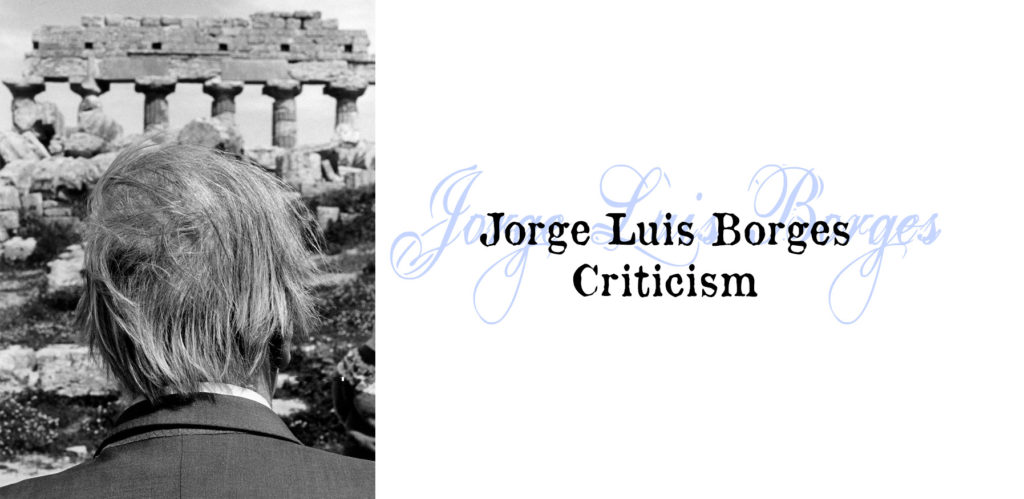Borges Criticism – Comparative Criticism
- At August 21, 2019
- By Great Quail
- In Borges
 0
0
There is no intellectual exercise which is not ultimately useless.
—Jorge Luis Borges, “Pierre Menard, Author of Don Quixote”
Borges Criticism: Comparative Criticism
This page collects English-language comparative criticism about Borges and his writing. These studies generally compare Borges with other writers or locate Borges’ work within a broader literary context, such as genre fiction or Latin American Literature. (A complete list of Borges Criticism can be accessed at the bottom of the page.) The books are listed in chronological order of publication. Clicking the image of a book takes you directly to Amazon.com. Wherever possible, links to the Internet Archive are provided. These “online editions” may or may not match the exact edition of the corresponding book.
Each book contains a brief description and a summary of its contents. Some have also been reviewed. If any knowledgable visitor would like to submit comments for any of the “unreviewed” works, please contact the Garden!
Borges y el cine (aka Borges en/y/sobre cine)
Borges In/And/On Film
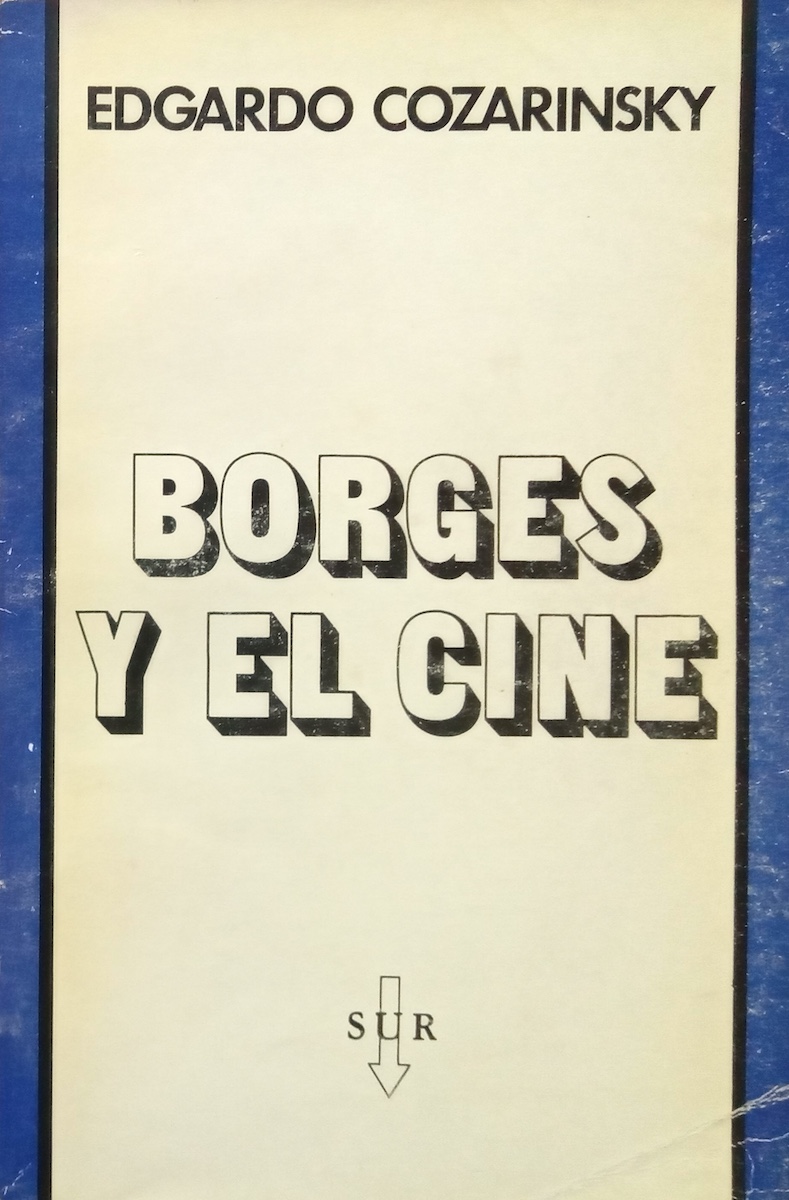 Borges y el cine By Edgardo Cozarinsky Buenos Aires: Sur, 1974 |
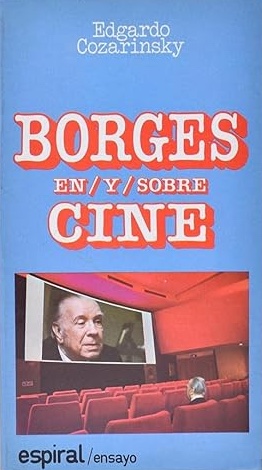 Borges en/y/sobre cine By Edgardo Cozarinsky Editorial Fundamento, 1980 |
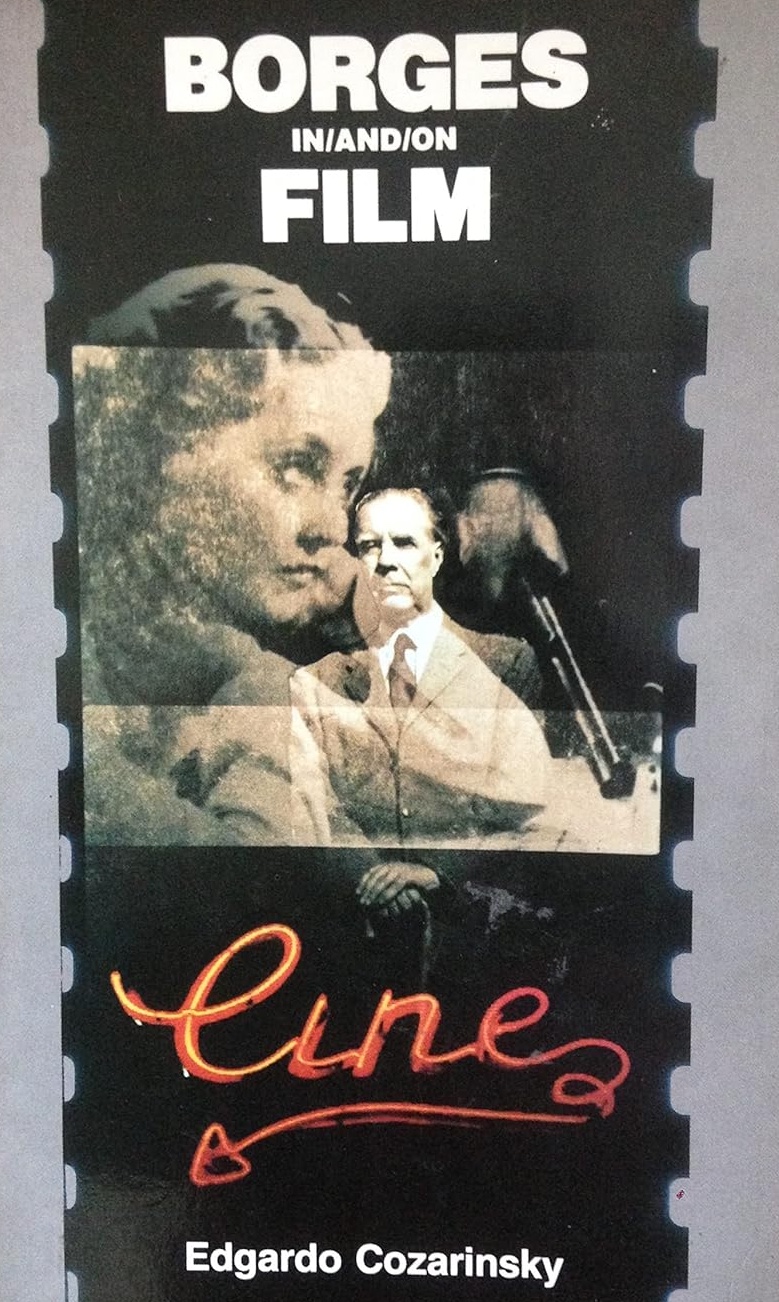 Borges In/And/On Film By Edgardo Cozarinsky Translation by Ronald Christ Lumen Books, 1988 Online at: Internet Archive |
Compiling all of Borges’ film reviews, Borges y el cine was published in 1974 by Edgardo Cozarinsky, an Argentine novelist, filmmaker, and film critic who was acquainted with Borges and Bioy Casares in the 1960s. The book was reissued as Borges en/y/sobre cine in 1980 by Editorial Fundamento; this version was translated into English by Ronald Christ and published as Borges In/And/On Film by Lumen Books in 1988. It has since been out of print. Along with Borges’ film reviews, Borges In/And/On Film includes a Borges-related filmography, two major essays by Cozarinsky, and the author’s reviews of cinematic Borges adaptations from from Diás de odio (1954) to Oraingoz Izen Gabe (1986).
Reviews: The Garden of Forking Paths has a full description and review of Borges In/And/On Film available in the “Borges Reviews” section.
Borges and His Successors
The Borgesian Impact on Literature and the Arts
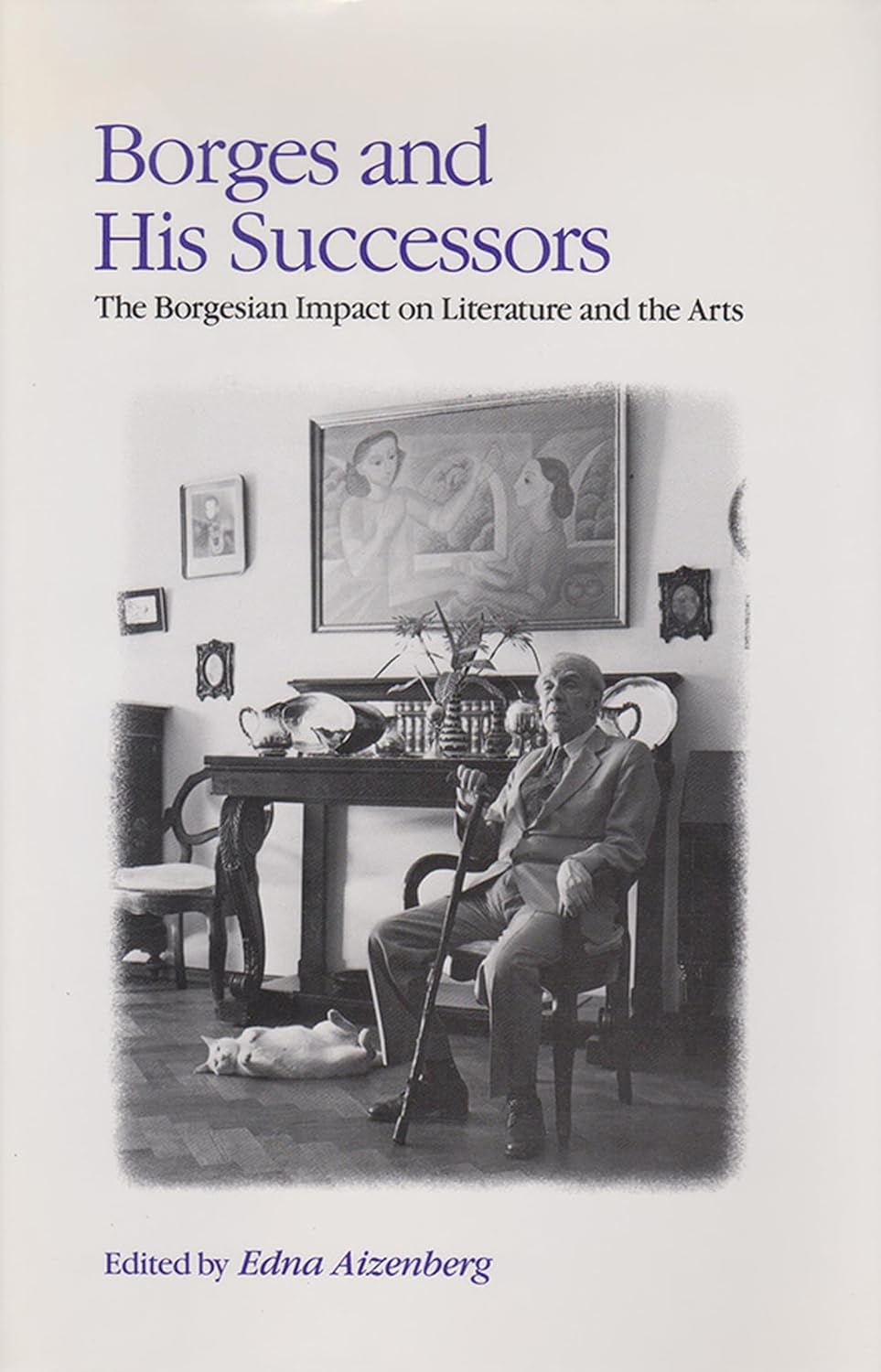
Borges and His Successors: The Borgesian Impact on Literature and the Arts
Edited by Edna Aizenberg
University of Missouri Press, 1989
Online at: Internet Archive
A professor at Marymount Manhattan College for over fifty years, Edna Aizenberg (1945–2018) was widely recognized a pioneer of Jewish studies in Latin American literature. Borges and His Successors is a collection of essays, papers, and lectures edited by Aizenberg. It includes two Borges lectures previously untranslated into English, “The Book of Job” and “Baruch Spinoza.”
Table of Contents:
Edna Aizenberg, “Introduction”
I. Redefining National Literatures
- Ana María Barrenechea, “On the Diverse (South American) Intonation of Some (Universal) Metaphors”
- Marta Morello-Frosch, “Borges and Contemporary Argentine Writers: Continuity and Change”
- Robert Ross, “It Cannot Not Be There: Borges and Australia’s Peter Carey”
- Rafael Gutiérrez Girardot, “Borges In Germany: A Difficult and Contradictory Fascination”
- Françoise Collin, “The Third Tiger; or, From Blanchot to Borges”
II. A New Critical Idiom
- Jaime Alazraki, “Borges’s Modernism and the New Critical Idiom”
- Gerry O’Sullivan, “The Library Is on Fire: Intertextuality in Borges and Foucault”
- Suzanne Jill Levine, “Borges and Emir: The Writer and His Reader”
- Emir Rodríguez Monegal, “Borges and Derrida: Apothecaries”
- Herman Rapaport, “Borges, De Man, and the Deconstruction of Reading”
- Christine de Lailhacar, “The Mirror and the Encyclopedia: Borgesian Codes in Umberto Eco’s The Name of the Rose”
III. In Dialogue with Other Writers
- Jerry Varsava, “The Last Fictions: Calvino’s Borgesian Odysseys”
- Geoffrey Green, “Postmodern Precursor: The Borgesian Image in Innovative American Fiction”
- Malva F. Filer, “Salvador Elizondo and Severo Sarduy: Two Borgesian Writers”
IV. The Visual Arts
- Richard Peña, “Borges and the New Latin American Cinema”
- Jules Kirschenbaum, “Dream of a Golem”
V. Hebraism and Poetic Influence
- Edna Aizenberg, “Borges and the Hebraism of Contemporary Literary Theory”
- Edna Aizenberg, “Introduction to Two Lectures by Borges”
- Jorge Luis Borges, “The Book of Job”
- Jorge Luis Borges, “Baruch Spinoza”
Garden Visitor John Canup comments:
The frontispiece photo shows Borges, with cane, seated in his apartment, beneath a painting by his sister and above the Borgesian cat (pure white, and thus perhaps deaf? a blind poet with a deaf cat)—doubtless the one that chewed to pulp the sleeve of Paul Theroux’s wool jacket in The Old Patagonian Express, Chapter 20, “The Buenos Aires Subterranean.”
Reviews: Samuel Bellman’s review of Borges and His Successors was published in Studies in Short Fiction, Vol. 28, Issue 1 (Spring 1991): pg. 109, [ProQuest paywall]. Lucille Kerr’s review appeared in Revista Hispánica Moderna, Vol. 45, Issue 2 (Dec. 1992): pg. 357, [ProQuest paywall]. Martin Stabb’s review was published in Penn State’s Comparative Literature Studies, Vol. 30, No. 1 (1993): pp. 103–106, [JSTOR paywall]. The following excerpts from Stabb’s review may be helpful in better understanding the collection:
Some of these articles have been published elsewhere, but most of the pieces appear here for the first time in English. In general they are very recent and a few are genuine finds for the serious student of Borges. In this connection I am thinking of an unusually perceptive study of Borges and Derrida authored by Emir Rodríguez Monegal only a month before Borges’ death and published in the relatively little known Uruguayan journal Maldoror. Of equal interest are two texts by Borges himself; one on the Book of Job, and the other on Spinoza. These were originally lectures and heretofore had appeared only in the Buenos Aires publication Conferencias of the Instituto Cultural Argentino-Israelí.
[…]
Not surprisingly, the eighteen essays of the collection vary considerably in scope, sophistication, and overall quality. While a few strike me as somewhat idiosyncratic, the volume in toto makes a solid contribution to the field. Aizenberg especially is to be commended for her work as editor, for her own stimulating essay, and for having rescued two Borges texts from virtual oblivion. To conclude, anyone wishing to get a good sense of recent Borges scholarship would do well to consult Borges and His Successors.
The Contemporary Praxis of the Fantastic
Borges and Cortázar
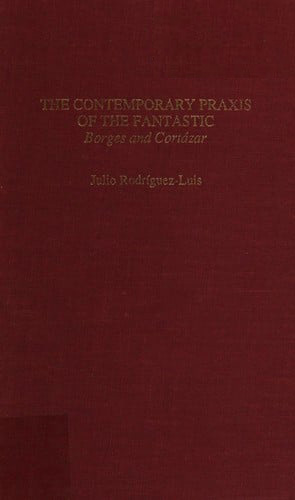
The Contemporary Praxis of the Fantastic: Borges and Cortázar
By Julio Rodríguez-Luis
Garland Science/Routledge 1991
Online at: Internet Archive
A Cuban writer and translator “living in exile” in the United States, Julio Rodríguez-Luis specializes in Caribbean and Latin American literature. He is professor emeritus at New York University. This book was published as Volume 143 in Garland’s “Reference Library of the Humanities.”
From Book News:
This study views Borges’ and Cortázar’s stories strictly from the point of view of a theory of the fantastic, with the intention of determining whether some of the stories are in fact fantastic narratives and, if so, to what extent. The book includes a brief review of the critical analysis of the fantastic, taking into account its Latin American manifestations.
The Mystery to a Solution
Poe, Borges, and the Analytic Detective Story
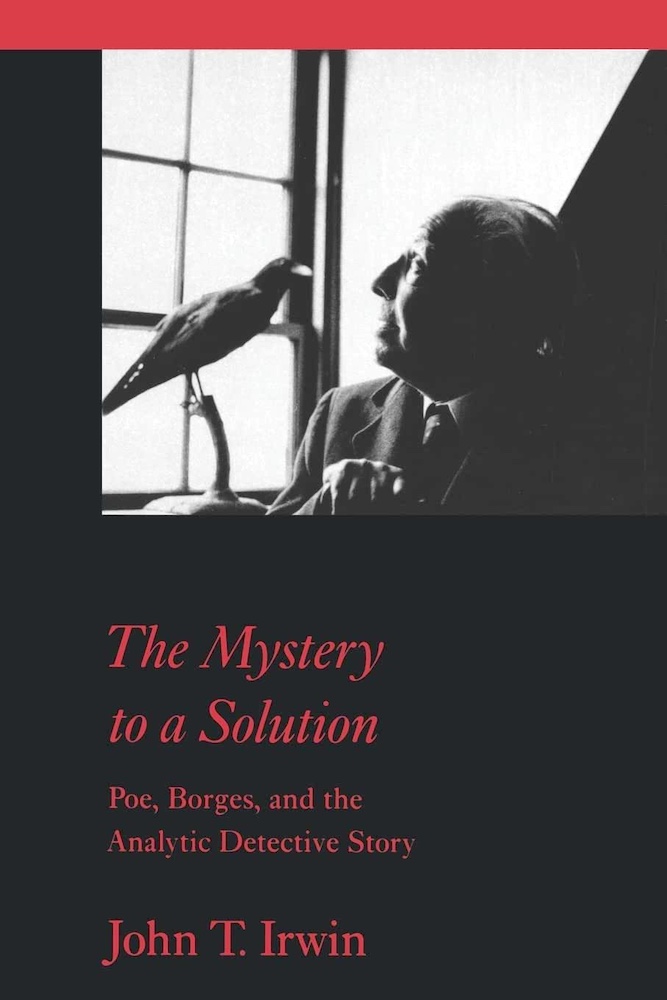
The Mystery to a Solution: Poe, Borges, and the Analytic Detective Story
By John T. Irwin
Johns Hopkins University Press, 1994
Online at: Internet Archive
A former Navy officer, John Irwin is a poet and literary critic who served as the editor of the Georgia Review in the mid-1970s. After relocating to the Johns Hopkins University, he published a book about William Faulkner. The Mystery to a Solution is Irwin’s third book, and was singled out for prestigious awards in comparative criticism from both Phi Beta Kappa and the MLA.
Publisher’s Description: In The Mystery to a Solution, John Irwin brilliantly examines the deeper significance of the analytical detective genre which Poe created and the meaning of Borges’ efforts to “double” the genre’s origins one hundred years later. Combining history, literary history, and practical and speculative criticism, Irwin pursues the issues underlying the detective story into areas as various as the history of mathematics, classical mythology, the double-mirror structure of self-consciousness, the anthropology of Evans and Frazer, the structure of chess, the mind-body problem, the etymology of the word labyrinth, and dozens of other topics. Irwin mirrors the aesthetic impact of the genre by creating in his study the dynamics of a detective story—the uncovering of mysteries, the accumulation of evidence, the tracing of clues, and the final solution that ties it all together.
Reviews: Perhaps because of its broad appeal, Irwin’s book has been widely reviewed. Scott Peeples’ review was published in Criticism: a Quarterly for Literature and the Arts, Vol. 36, Issue 4, (Fall 1994): pg. 620, [ProQuest paywall]. Ronald R. Thomas’ review appeared in Modernism/modernity, Vol. 2, No. 2 (April 1995): pp. 94–97, [Project MUSE paywall]. John Mowat’s review ran in The Modern Language Review, Vol. 90, Issue 2 (April 1995): pg. 427, [ProQuest paywall]. Dean Flower’s review was published in The Hudson Review, Vol. 48, No. 1 (Spring 1995): pp. 153–160, [JSTOR paywall].
Of all these reviews, Dean Flower’s critique makes the most enjoyable read. Finding Irwin’s arguments “frequently more ingenious than persuasive,” Flower has some fun skewering the author’s “scholarly madness” and “excesses and vagaries.” Despite his many criticisms, however, Flower gracefully acknowledges Irwin’s originality and attention to detail, and on the balance, finds the book worth reading.
A Garden visitor contributes the following comment:
Irwin’s award winning book is a stimulating application of now traditional “new” literary criticism/analysis and more recent and trendy (read: quasi-post-modern) devices. The result is a frequently absorbing study of the labyrinthine minds of Poe and Borges, as seen principally through their related six detective pieces. Unfortunately the sutures as well as the strivings-for-effect from Irwin’s foundational lectures stand too proud, making for greater appeal to academics than to even highly-motivated general readers. Irwin’s work would find and deserve more cover-to-cover readers, rather than citation researchers, if a second edition were edited for repetitiveness and prolixity.
Reading Borges After Benjamin
Allegory, Afterlife, and the Writing of History
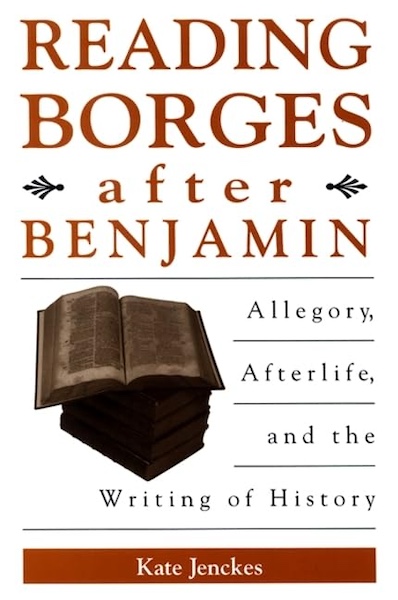
Reading Borges After Benjamin: Allegory, Afterlife, and the Writing of History
By Kate Jenckes
State Univ of New York Press, 2007
Kate Jenckes is Professor of Spanish in the Department of Romance Languages and Literature at the University of Michigan. She specializes in Latin American literature and “the relationship between politics and aesthetics, especially the ways that language and other modes of inscription—particularly as staged by literature and other forms of culture—resist totalizing structures, from words and concepts to complete systems.”
Publisher’s Description: This book explores the relationship between time, life, and history in the work of Jorge Luis Borges and examines his work in relation to his contemporary, Walter Benjamin. By focusing on texts from the margins of the Borges canon—including the early poems on Buenos Aires, his biography of Argentina’s minstrel poet Evaristo Carriego, the stories and translations from A Universal History of Infamy, as well as some of his renowned stories and essays—Kate Jenckes argues that Borges’s writing performs an allegorical representation of history. Interspersed among the readings of Borges are careful and original readings of some of Benjamin’s finest essays on the relationship between life, language, and history. Reading Borges in relationship to Benjamin draws out ethical and political implications from Borges’s works that have been largely overlooked by his critics.
Reviews: Thomas McEnaney’s review of Reading Borges After Benjamin may be read at the Borges Center [PDF].
Borges and Joyce: An Infinite Conversation
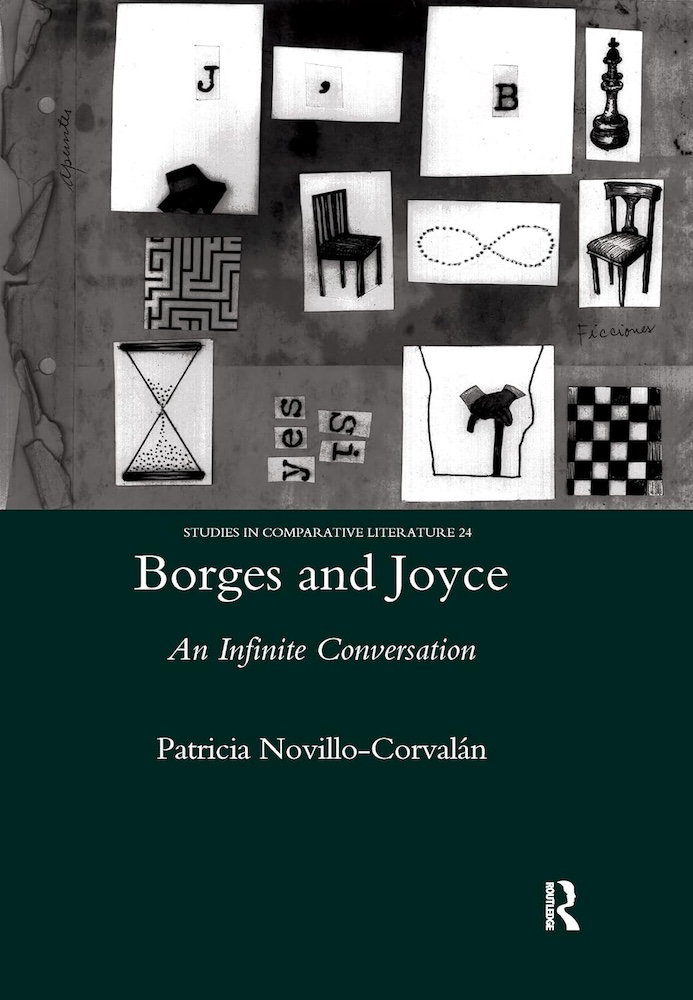
Borges and Joyce: An Infinite Conversation
By Patricia Novillo-Corvalán
Routledge, 2011
Born in Argentina, Patricia Novillo-Corvalán is a Professor of Comparative Literature at the University of Kent. Her research “explores issues of identity, nation, empire, race, and gender through the idea of writers’ networks, circulations, afterlives, and receptions, particularly in relation to Latin America, Ireland, India, and British modernism.” Borges and Joyce was her first publication.
Publisher’s Description: In this volume, Novillo-Corvalán brings together two major twentieth-century authors, James Joyce and Jorge Luis Borges. With the chronology of their writing in mind, Novillo-Corvalán focuses on Joyce’s influence upon Borges. She provides a detailed discussion of the reception and translation of Joyce’s work in Latin America, particularly in Buenos Aires (chapter one); she then turns to Borges’s translation of, critical response to, and creative reinterpretation of Joyce’s fiction (chapter two). In comparing and contrasting the two authors, she highlights Joyce’s aesthetic of expansion and Borges’s aesthetic of compression. Although many of Joyce’s texts receive fair attention, her emphasis is on Ulysses, which she reveals as a precursor to a number of Borges’s stories, most memorably “Funes el memorioso” (chapter three). In the second half of the book, Novillo-Corválan reinforces the connection between Joyce and Borges by exploring their shared interest in other literary giants; the volume’s final three chapters are dedicated to an analysis of their critical and creative responses to Homer, Dante and Shakespeare respectively. Borges and Joyce: An Infinite Conversation deftly employs cultural, geographical, biographical, linguistic and literary analysis; in doing so, it provides readers with a better understanding of Joyce, Borges, and the connections between them.
Table of Contents:
- Introduction: Towards Comparative Literature
- Ulysses in Transit, from Paris to Buenos Aires: The Cross-Cultural Transactions of Larbaud, Borges, and Güiraldes
- Borges’s Reception of Joyce in the Argentine Press
- James Joyce, Author of “Funes the Memorious”
- In Praise of Darkness: Homer, Joyce, Borges
- Architects of Labyrinths: Dante, Joyce, Borges
- Joyce’s and Borges’s Afterlives of Shakespeare
- Conclusion: The Afterlives of James Joyce in Argentina
Reviews: Lucia Boldrini’s review of Borges and Joyce was published in the James Joyce Quarterly, Vol. 49, No. 3/4 (Spring-Summer 2012): pp. 689–692, [JSTOR paywall]. She concludes, “This is an ambitious and satisfying book that illuminates, through the prism of Borges, the work of Joyce and, through Joyce, the work of Borges; by examining both writers, it demonstrates how authors achieve their greatest originality through their engagement with other writers. It is a very welcome and important addition to our libraries.” Ben Bolig’s review appeared in The Modern Language Review, Vol. 108, Part 3 (July 2013): pp. 983–985, [Project MUSE paywall]. The book is also discussed in Jacob Bender’s “The Dead in the Garden of Forking Paths: Joyce, Borges, and their Infinite Ghosts,” which ran in Comparative Literature Studies, Vol. 56, No. 2 (2019): pp. 260–288, [JSTOR paywall].
Painting Borges
Philosophy Interpreting Art Interpreting Literature
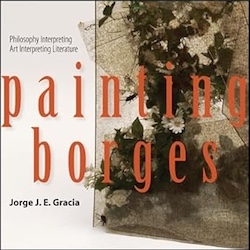
Painting Borges: Philosophy Interpreting Art Interpreting Literature
By Jorge J.E. Gracia
SUNY Press, 2012
Online at: Internet Archive
Jorge J.E. Gracia (1942–2021) was a Cuban-American philosopher who was a Distinguished Professor in the Department of Philosophy and Department of Comparative Literature in the State University of New York at Buffalo.
Publisher’s Description: In this groundbreaking book, Jorge J. E. Gracia explores the artistic interpretation of fiction from a philosophical perspective. Focusing on the work of Jorge Luis Borges, one of the most celebrated literary figures of Latin America, Gracia offers original interpretations of twelve of Borges’s most famous stories about identity and memory, freedom and destiny, and faith and divinity. He also examines twenty-four artistic interpretations of these stories—two for each—by contemporary Argentinean and Cuban artists such as Carlos Estévez, León Ferrari, Mirta Kupferminc, Nicolás Menza, and Estela Pereda. This philosophical exploration of how artists have interpreted literature contributes to both aesthetics and hermeneutics, makes new inroads into the understanding of Borges’s work, and introduces readers to two of the most vibrant artistic currents today. Color images of the artworks discussed are included.
Reviews: Sonia Thon’s review of Painting Borges was published in Hispania, Vol. 96, No. 4 (December 2013): pp. 785–786, [Project MUSE]. Alan Singer’s review appeared in symploke, Vol. 22, No. 1–2 (2014), [Free PDF at Project MUSE].
Kant’s Dog
On Borges, Philosophy, and the Time of Translation
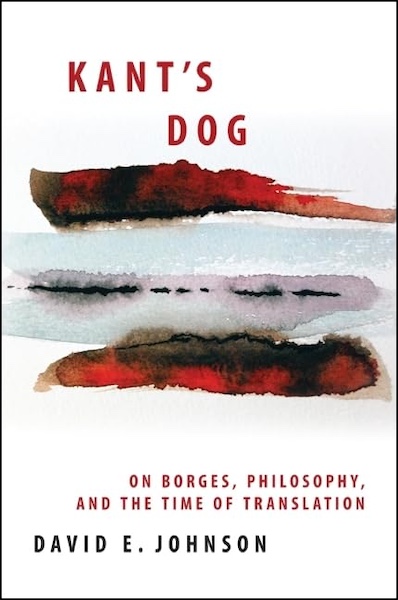
Kant’s Dog: On Borges, Philosophy, and the Time of Translation
By David E. Johnson
State University of New York Press, 2013
David E. Johnson is Associate Professor of Comparative Literature at the University at Buffalo, State University of New York. His areas of interest include Borges, Derrida, “continental and Latin American philosophy, and Latin American narrative.” Johnson is the co-editor of Thinking with Borges and the co-editor of CR: The New Centennial Review.
Publisher’s Description: Situates Borges at the limit of philosophy and literature. Kant’s Dog provides fresh insight into Borges’s preoccupation with the contradiction of the time that passes and the identity that endures. By developing the implicit logic of the Borgesian archive, which is most often figured as the universal demand for and necessary impossibility of translation, Kant’s Dog is able to spell out Borges’s responses to the philosophical problems that most concerned him, those of the constitution of time, eternity, and identity; the determination of original and copy; the legitimacy of authority; experience; the nature of language and the possibility of a decision; and the name of God. Kant’s Dog offers original interpretations of several of Borges’s best known and most important stories and of the works of key figures in the history of philosophy, including Aristotle, Saint Paul, Maimonides, Hume, Locke, Kant, Heidegger, and Derrida. This study outlines Borges’s curious relationship to literature and philosophy and, through a reconsideration of the relation between necessity and accident, opens the question of the constitution of philosophy and literature. The afterword develops the logic of translation toward the secret at the heart of every culture in order to posit a Borgesian challenge to anthropology and cultural studies.
Reviews: Silvia G. Dapía’s review of Kant’s Dog was published in symploke, Vol. 21, No. 1–2 (2013): pp. 399–401, [Project MUSE paywall]. She called the book an “extremely insightful, rigorous, and well-argued” response to “philosophical problems such as time and identity, original and copy, and undecidability.” Stephen D. Gingerich’s review appeared in Interdisciplinary Literary Studies, Vol. 17, No. 4 (2015): pp. 635–639, [Project MUSE paywall].
Borges the Unacknowledged Medievalist
Old English and Old Norse in His Life and Work
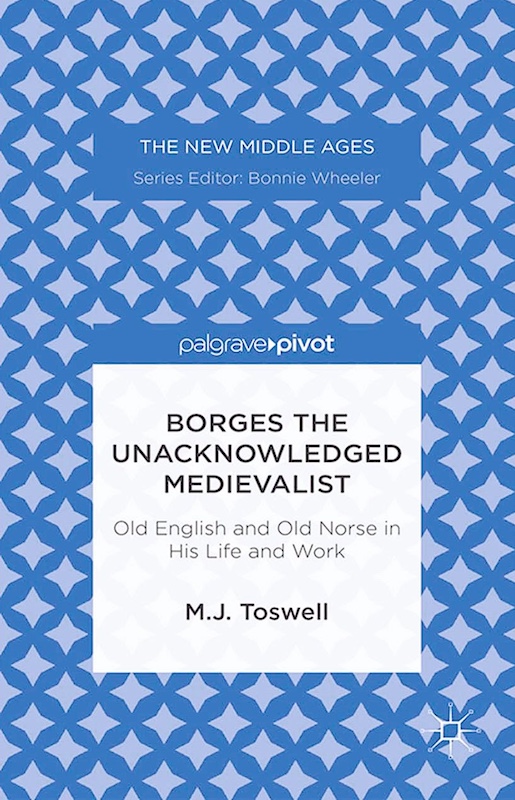
Borges the Unacknowledged Medievalist: Old English and Old Norse in His Life and Work
By M.J. Toswell
Palgrave Pivot, 2014
M.J. Toswell is a Professor of English at the University of Western Ontario. She specializes in medieval literature, speculative fiction, and feminist studies. She also translated Borges’ Ancient Germanic Literatures for ACMRS in 2014. The second revision of an earlier work, Borges the Unacknowledged Medievalist is part of Palgrave’s “New Middle Ages” series, which focuses on “pluridisciplinary studies of medieval cultures, with particular emphasis on recuperating women’s history and on feminist and gender analysis.”
Publisher’s Description: The Argentinian writer and poet Jorge Luis Borges was many things during his life, but what has gone largely unnoticed is that he was a medievalist, and his interest in Germanic medievalism was pervasive throughout his work. This study will consider the medieval elements in Borges creative work and shed new light on his poetry.
Table of Contents:
1. Introduction
2. The Germanic Medievalism of Borges’ Life
3. Borges the Poet
4. Borges the Scholar and Writer
5. Borges the Fabulist
6. Borges’ Medievalism
Reviews: Daniel de Paula Valentim Hutchins’ review of Borges the Unacknowledged Medievalist appeared on Medievally Speaking on 7 September 2005. He concludes: “For those of us who have read and taught Borges, Toswell’s book may offer an uncanny sense of encountering an old friend under new circumstances, a mix of the strange and the familiar. For scholars of medieval studies who have yet to read Borges, Toswell’s analysis of how Borges used (and, in a sense, lived) medievalism will serve as a sustained and earnest argument for why you should do so immediately.”
Borges’s Poe
The Influence and Reinvention of Edgar Allan Poe in Spanish America
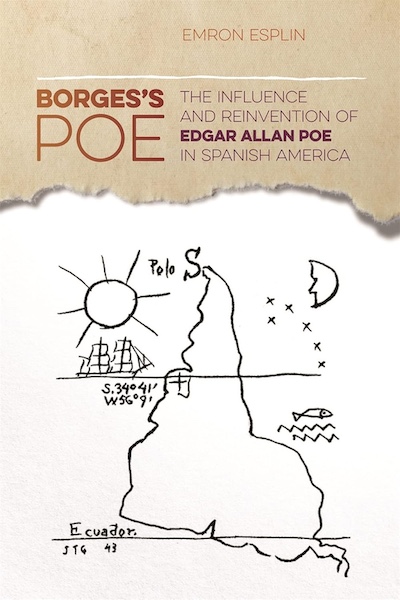
Borges’s Poe: Influence and Reinvention of Edgar Allan Poe in Spanish America
By Emron Esplin
University of Georgia Press, 2016
Online at: JSTOR [Paywall]
Emron Esplin is Assistant Professor of English at Brigham Young University. His areas of interest are 19th–20th Century U.S. Literature and Inter-American Literary Studies.
Publisher’s Description: Edgar Allan Poe’s image and import shifted during the twentieth century, and this shift is clearly connected to the work of three writers from the Río de la Plata region of South America―Uruguayan Horacio Quiroga and Argentines Jorge Luis Borges and Julio Cortázar. In Borges’s Poe, Emron Esplin focuses on the second author in this trio and argues that Borges, through a sustained and complex literary relationship with Poe’s works, served as the primary catalyst that changed Poe’s image throughout Spanish America from a poet-prophet to a timeless fiction writer. Most scholarship that couples Poe and Borges focuses primarily on each writer’s detective stories, refers only occasionally to their critical writings and the remainder of their fiction, and deemphasizes the cultural context in which Borges interprets Poe. In this book, Esplin explores Borges’s and Poe’s published works and several previously untapped archival resources to reveal an even more complex literary relationship between the two writers. Emphasizing the spatial and temporal context in which Borges interprets Poe―the Río de la Plata region from the 1920s through the 1980s―Borges’s Poe underlines Poe’s continual presence in Borges’s literary corpus. More important, it demonstrates how Borges’s literary criticism, his Poe translations, and his own fiction create a disparate Poe who serves as a precursor to Borges’s own detective and fantastic stories and as an inspiration to the so-called Latin American Boom. Seen through this more expansive context, Borges’s Poe shows that literary influence runs both ways since Poe’s writings visibly affect Borges the poet, story writer, essayist, and thinker while Borges’s analyses and translations of Poe’s work and his responses to Poe’s texts in his own fiction forever change how readers of Poe return to his literary corpus.
Table of Contents:
Introduction. Reciprocal Influence
Part 1. Renaming Poe: Jorge Luis Borges’s Literary Criticism on Edgar Allan Poe
1. Borges’s Philosophy of Poe’s Composition
2. Reading and Rereading
Part 2. Translating Poe: Jorge Luis Borges’s Edgar Allan Poe Translations
3. Theory, Practice, and Pym
4. Facts and an Envelope
Part 3. Rewriting Poe: Jorge Luis Borges’s Poe-Influenced and Poe-Influencing Short Fiction
5. Buried Connections
6. Supernatural Revenge
Epilogue. Commemorative Reframing
Reviews: Whitney S. May’s review of Borges’s Poe was published in The Edgar Allan Poe Review, Vol. 17, No. 2 (Autumn 2016): pp. 196–198, [Project MUSE paywall]. Steven Wenz’s review appeared in Comparative Literature Studies, Vol. 54, No. 2 (2017): pp. 472–475, [Project MUSE paywall]. Santiago Rodríguez Guerrero-Strachan’s review was published in Revista de Estudios Norteamericanos No. 22 (2018), [PDF].
Bandit Narratives in Latin America
From Villa to Chávez
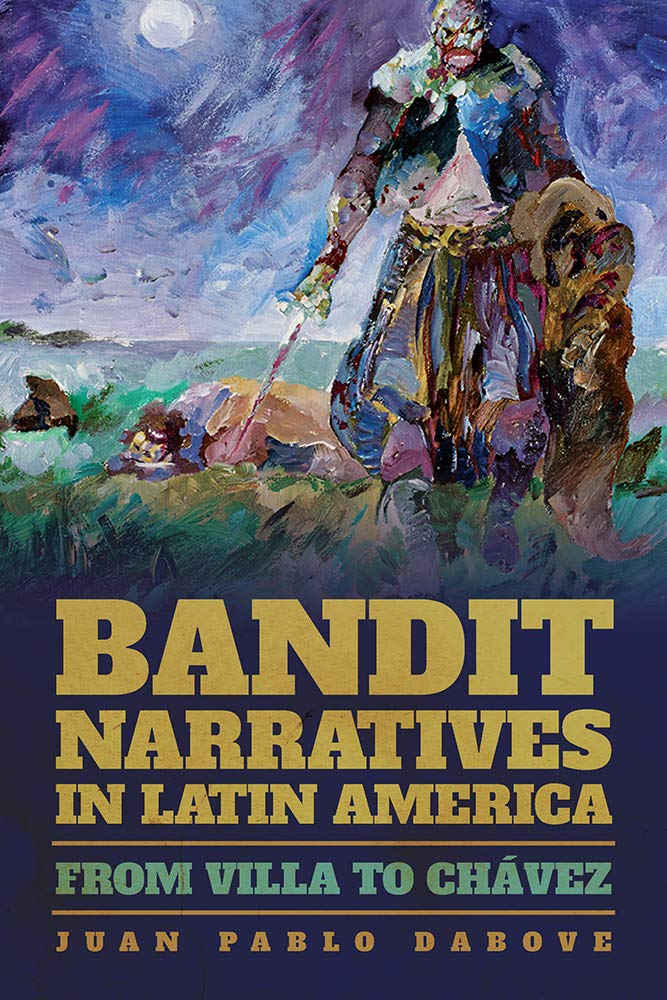
Bandit Narratives in Latin America from Villa to Chávez
By Juan Pablo Dabove
University of Pittsburgh Press, 2017
Online at: JSTOR [Paywall]
Juan Pablo Dabove is Professor of Spanish and Portuguese at the University of Colorado. His 2007 book, Nightmares of the Lettered City: Banditry and Literature in Latin America (1816–1929) featured several chapters on Argentina and gaucho lore, including a chapter devoted to José Hernández’s epic poem Martín Fierro, the subject of a 1953 Borges study. Bandit Narratives in Latin America expands on this earlier book, and includes a chapter devoted to Borges.
Publisher’s Description: Bandits seem ubiquitous in Latin American culture. Even contemporary actors of violence are framed by narratives that harken back to old images of the rural bandit, either to legitimize or delegitimize violence, or to intervene in larger conflicts within or between nation-states. However, the bandit escapes a straightforward definition, since the same label can apply to the leader of thousands of soldiers (as in the case of Villa) or to the humble highwayman eking out a meager living by waylaying travelers at machete point. Dabove presents the reader not with a definition of the bandit, but with a series of case studies showing how the bandit trope was used in fictional and non-fictional narratives by writers and political leaders, from the Mexican Revolution to the present. By examining cases from Argentina, Brazil, Mexico, Peru, and Venezuela, from Pancho Villa’s autobiography to Hugo Chávez’s appropriation of his “outlaw” grandfather, Dabove reveals how bandits function as a symbol to expose the dilemmas or aspirations of cultural and political practices, including literature as a social practice and as an ethical experience.
Reviews: Brandon Morgan’s review of Bandit Narratives in Latin America was published in The Latin Americanist, Vol. 61, No. 4 (Dec. 2017): pp. 609–611, [Project MUSE paywall]. Rafael Acosta Morales’ review appeared in Revista de Estudios Hispánicos, Vol. 53, No.1 (March 2019): pp. 402–404, [Project MUSE paywall].
Borges and Kafka: Sons and Writers
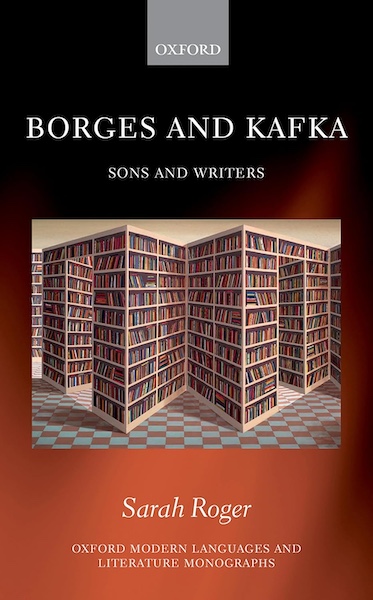
Borges and Kafka: Sons and Writers
By Sarah Roger
Oxford University Press, 2018
Sarah Roger is a Lecturer in Spanish at St. Edmund Hall, Oxford University. Borges and Kafka is an expansion of her doctoral dissertation.
Publisher’s Description: Sarah Roger investigates Jorge Luis Borges’s development as an author in light of Franz Kafka’s influence, and in consideration of Borges’s relationship with his father, Jorge Guillermo Borges (Borges pere, a failed author). Borges believed that much of Kafka’s writing derived from his personal experiences, particularly his relationship with his father. This book looks at how reading Kafka helped Borges mediate and make productive use of his own relationship with his father, and it offers a thorough analysis of Borges pere’s writing, which is supplemented by an appendix that reprints Borges pere’s poetry for the first time. Borges and Kafka also provides extensive analysis of Kafka’s presence in Borges’s critical writing, his translations, and the stories that he modelled on Kafka. Particular attention is paid to the concepts that Borges identified as Kafka’s obsessions: subordination, infinity, and hierarchical relationships, which Borges referred to as the “patria potestad.” Roger’s analysis is accompanied by an annotated bibliography documenting every mention of Kafka in Borges’s writing and a list of every Kafka text Borges read. Kafka’s influence is especially evident in the stories where Borges was openly imitating Kafka—“La loteria en Babilonia” (1941), “La biblioteca de Babel” (1941), and “El Congreso” (1971)—but it features throughout Ficciones. Reading Borges’s writing in light of his interest in Kafka demonstrates his focus not just on the individual’s subordinate place in an infinite hierarchy but also on the repercussions these circumstances had for a struggling author like Borges, who was seeking to define himself through his writing.
Reviews: Christopher Warnes’ review of Borges and Kafka was published in Variaciones Borges, No. 44 (2017): pp. 260–262, [JSTOR paywall]. Michael Palencia-Roth’s review appeared in Comparative Literature Studies, Vol. 55, No. 2 (2018): pp. 434–438, [Project MUSE paywall].
Borges’ Classics
Global Encounters with the Graeco-Roman Past
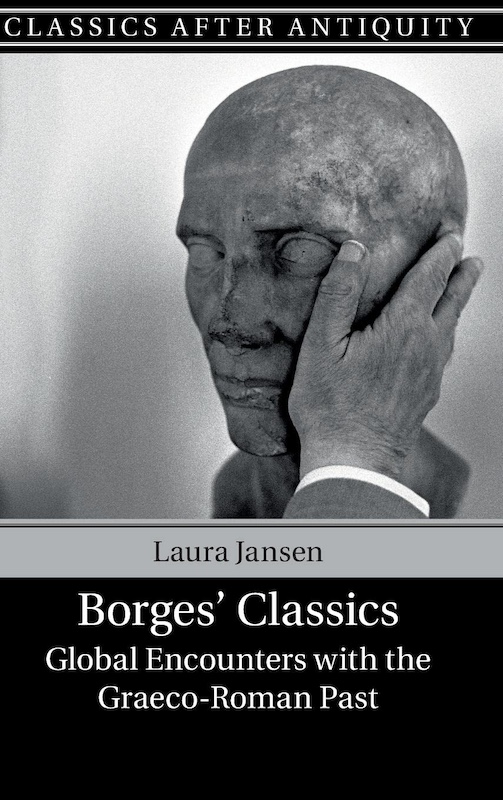
Borges’ Classics: Global Encounters with the Graeco-Roman Past
By Laura Jansen
Cambridge University Press, 2018
Laura Jansen lectures in Latin Language and Literature at the University of Bristol. Her research focuses on the “oblique histories of the classical tradition as it emerges in the reception of avant-garde authors fascinated by the themes of fragmentation, occlusion, dispersal, silence, forgetfulness, and loss.” She is the editor of Bloomsbury’s Classical Receptions in Twentieth-Century Writing series.
Publisher’s Description: In Borges’ Classics, Laura Jansen reads the oeuvre of the Argentine author Jorge Luis Borges as a radically globalized model for reimagining our relationship with the classical past. This major study reveals how Borges constructs a new “physics of reading” the classics, which privileges a paradoxical vision of the canon as universal yet centreless, and eschews fixed ideas about the cultural history of the West. Borges’ unique approach transforms classical antiquity into a simultaneously familiar and remote world, whose legacy is both urgent and unstable. In the process, Borges repositions the classical tradition at the intersection of the traditional Western canon and modernist literature of the peripheral West. Jansen’s study traces Borges’ encounters with the classics through appeal to themes central to Borges’ thought, such as history and fiction, memory and forgetfulness, the data of the senses, and the vectors that connect cultures and countries.
Table of Contents:
1. Borges’ Classical Revisions
A Rumour of Homer
Pierre Menard’s Odyssey and Aeneid
Zeno after Kafka
Classical Memory and Forgetfulness
Classical Absences and Desires
Classics at the Crossroads: Towards a Global Vision Key Terms and Concepts
Aims and Scope of the Book
2. The Flow of Heraclitus
Borgesian Time and the Classics
Heraclitean Receptions
Receptions of the Unfinished Text
Borges and the Disclosure of Antiquity
3. The Idea of Homer
Homer in Borges’ Postclassical Landscapes
Homeric Identities and Identifications
Odyssean Voyages into the Post-Historical
Self Borges’ Homer in the Twentieth Century
4. Virgil’s Touch
The Cultural Geography of Borges’ Virgil
The Slow Hand and the Tears of Things
Borges’ Virgil in Cultural History and Aesthetics
5. Antiquity in the Poetic Cosmos
Classical Fragments in Borges’ Poetic Siluae
Myth, Poetry and the Möbius Effect of Literature
Heraclitus between Chaos and Universal History
6. Interlude: Borges and Global Classics
Global Classics and the Centreless Perspective
Antiquity as a Fragment
Borges’ Global Classicism ‘World’ Literature
Global Classics vs World Studies
7. Successors of Borges Classicism
Italo Calvino
Umberto Eco
Derek Walcott
Reviews: Stephen Gingerich’s review of Borges’ Classics was published in Comparative Literature Studies, Vol. 58, No. 1 (2021): pp. 215–217, [Project MUSE paywall].
Borges on Shakespeare
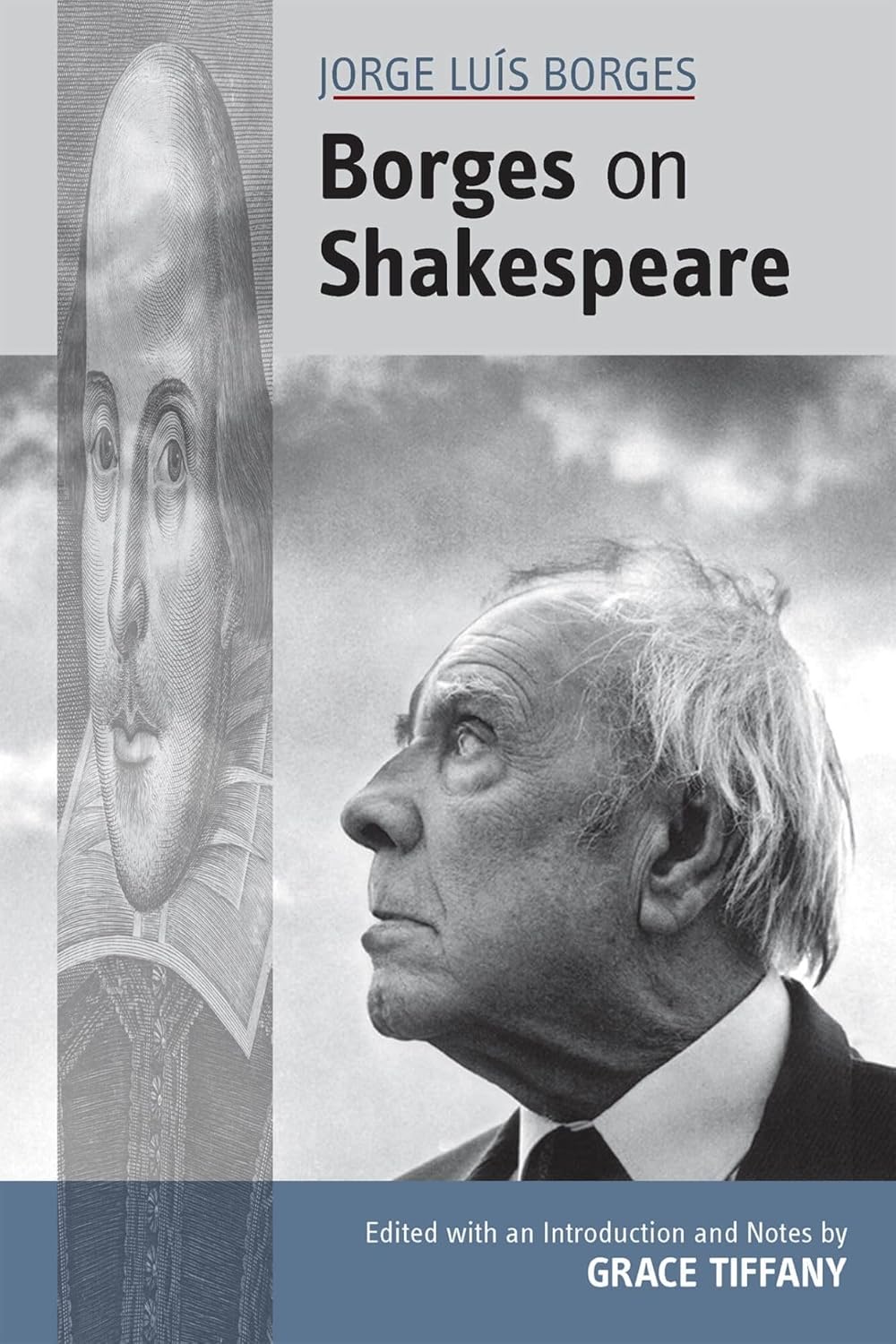
Borges on Shakespeare
Edited and Translated by Grace Tiffany
ACMRS Press, 2018
Grace Tiffany is an American Shakespeare scholar and writer of historical novels. She’s also been published on the Renaissance and Ben Johnson. Volume 543 of the Medieval and Renaissance Texts and Studies, Tiffany’s Borges On Shakespeare was a labor of love, produced in cooperation with Penguin, the Folder Library, and the Borges Estate.
Publisher’s Description: Celebrated Argentine author Jorge Luis Borges found Shakespeare’s work so compelling that he not only fictively imagined the life of the playwright in two short stories, but also fashioned other stories and poems into adaptations of or meditations on Shakespeare’s plays, wrote essays about Shakespeare, and discussed him frequently in interviews, university lectures, and public talks. In this volume, Grace Tiffany gathers together all these varied writings and conversations. A critical edition, Borges on Shakespeare contains a lengthy introduction by its editor; annotated Borges stories, poems, essays, and transcribed talks (including his famous tales “Everything and Nothing” and “Shakespeare’s Memory”); essay contributions and one piece of fiction by Borges scholars; and a bibliography. Borges’ “Shakespeare” material has heretofore been available to readers only in scattered sources. Combining them in one, Borges on Shakespeare directly addresses Borges’ lifelong engagement with Shakespeare, an author of tremendous significance to his own work and thought, and renders some Borges work sin English translation for the first time. Borges on Shakespeare will be useful to scholars of Shakespeare, Borges, and comparative literature and drama, as well as to the general reader who enjoys Shakespeare, Borges’ fiction, or both.
Additional Information
Grace Tiffany wrote an amusing post about her efforts to get this book published on her blog, Shakespeare In Fiction and Fact.
Borges and Kafka, Bolaño and Bloom
Latin American Authors and the Western Canon
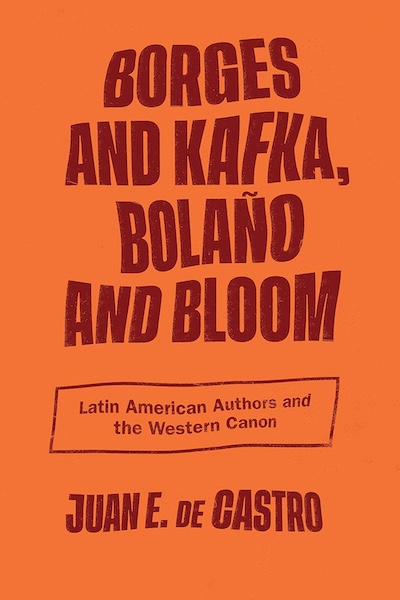
Borges and Kafka, Bolaño and Bloom
By Juan E. de Castro
Vanderbilt University Press, 2022
Online at: JSTOR [Paywall]
Juan E. De Castro is an Associate Professor in Literary Studies at Eugene Lang College, the New School for Liberal Studies. He has written on “diverse topics in Latin American literature: including the work of the Peruvian novelist Mario Vargas Llosa; on the way revolution and revolutionary thinking has been depicted in the region’s fiction; and on the political and cultural activism of the Peruvian Marxist José Carlos Mariátegui, during the 1920s.”
Publisher’s Description: At a time in which many in the United States see Spanish America as a distinct and, for some, threatening culture clearly differentiated from that of Europe and the US, it may be of use to look at the works of some of the most representative and celebrated writers from the region to see how they imagined their relationship to Western culture and literature. In fact, while authors across stylistic and political divides—like Gabriela Mistral, Jorge Luis Borges, or Gabriel García Márquez—see their work as being framed within the confines of a globalized Western literary tradition, their relationship, rather than epigonal, is often subversive. Borges and Kafka, Bolaño and Bloom is a parsing not simply of these authors’ reactions to a canon, but of the notion of canon writ large and the inequities and erasures therein. It concludes with a look at the testimonial and autobiographical writings of Rigoberta Menchú and Lurgio Gavilán, who arguably represent the trajectory of Indigenous testimonial and autobiographical writing during the last forty years, noting how their texts represent alternative ways of relating to national and, on occasion, Western cultures. This study is a new attempt to map writers’ diverse ways of thinking about locality and universality from within and without what is known as the canon.
Table of Contents:
Introduction
Chapter 1: Harold Bloom in the Hispanic World: From Classic to Canon
Chapter 2: Latin American Women Writers and Western Literature: On Sor Juana, Gabriela Mistral, and Others
Chapter 3: Jorge Luis Borges and the Canon
Chapter 4: Rewriting Kafka in Latin America
Chapter 5: Gabo’s Canon: Gabriel García Márquez and the World Canon
Chapter 6: Roberto Bolaño on/in the Canon
Chapter 7: Indigenous Writers and the West
Epilogue
Notes
Works Cited
Index
The Rigor of Angels
Borges, Heisenberg, Kant, and the Ultimate Nature of Reality
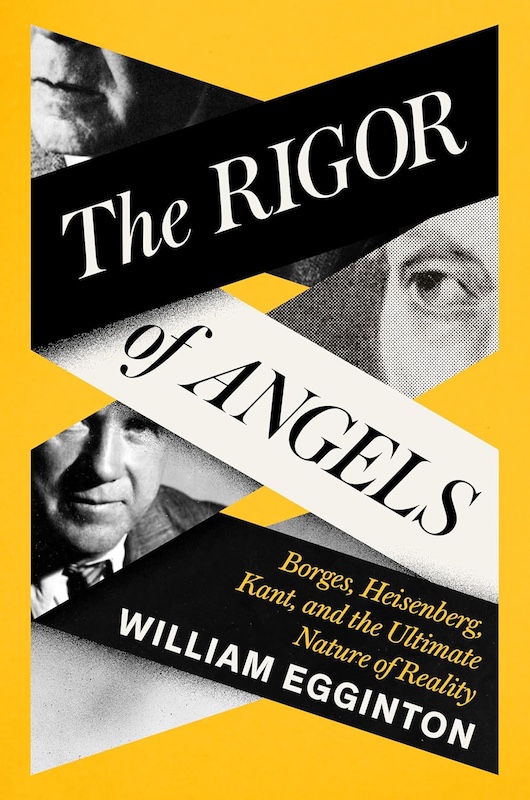
The Rigor of Angels: Borges, Heisenberg, Kant, and the Ultimate Nature of Reality
By William Egginton
Pantheon, 2023
American literary critic William Eggington is a Professor in the Humanities, chair of the Department of Modern Languages and Literatures, and Director of the Alexander Grass Humanities Institute at the Johns Hopkins University, where he teaches on “Spanish and Latin American literature, literary theory, and the relation between literature and philosophy.” He is the co-editor of Thinking with Borges.
Publisher’s Description: Argentine poet Jorge Luis Borges was madly in love when his life was shattered by painful heartbreak. But the breakdown that followed illuminated an incontrovertible truth—that love is necessarily imbued with loss, that the one doesn’t exist without the other. German physicist Werner Heisenberg was fighting with the scientific establishment on the meaning of the quantum realm’s absurdity when he had his own epiphany—that there is no such thing as a complete, perfect description of reality. Prussian philosopher Immanuel Kant pushed the assumptions of human reason to their mind-bending conclusions, but emerged with an idea that crowned a towering philosophical system—that the human mind has fundamental limits, and those limits undergird both our greatest achievements as well as our missteps. Through fiction, science, and philosophy, the work of these three thinkers coalesced around the powerful, haunting fact that there is an irreconcilable difference between reality “out there” and reality as we experience it. Out of this profound truth comes a multitude of galvanizing ideas: the notion of selfhood, free will, and purpose in human life; the roots of morality, aesthetics, and reason; and the origins and nature of the cosmos itself. As each of these thinkers shows, every one of us has a fundamentally incomplete picture of the world. But this is to be expected. Only as mortal, finite beings are we able to experience the world in all its richness and breathtaking majesty. We are stranded in a gulf of vast extremes, between the astronomical and the quantum, an abyss of freedom and absolute determinism, and it is in that center where we must make our home. A soaring and lucid reflection on the lives and work of Borges, Heisenberg, and Kant, The Rigor of Angels movingly demonstrates that the mysteries of our place in the world may always loom over us—not as a threat, but as a reminder of our humble humanity.
Reviews: A non-academic book, The Rigor of Angels has been widely reviewed in traditional media, including The New York Times, The New York Review of Books, The Wall Street Journal, and the Times Literary Supplement.
Borges Criticism
Main Page — Return to the Borges Criticism main page and index.
General Criticism 1 — General literary criticism and commentary written during Borges’ life, 1957–1986.
General Criticism 2 — General literary criticism and commentary written from 1987 to 1999.
General Criticism 3 — General literary criticism and commentary written from 2000 to the present.
Poetics — Criticism written about Borges’ poetry and poetics.
Political & Theoretical Criticism — Borges criticism with a strong political, theoretical, or philosophical component: Marxist critique, postmodernism, postcolonial studies, gender studies, queer theory, disability studies, etc.
Religious & Esoteric Criticism — Borges criticism from a religious, metaphysical, or esoteric perspective.
Scientific Criticism — Borges criticism within the disciplines of science, mathematics, and technology.
Author: Allen B. Ruch
Last Modified: 30 August 2024
Main Borges Page: The Garden of Forking Paths
Contact: quail(at)shipwrecklibrary(dot)com

